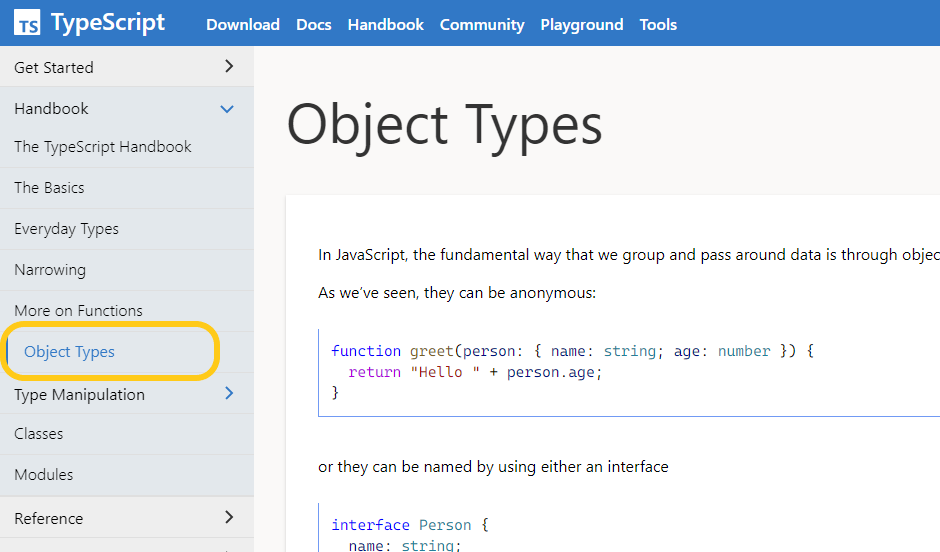-
-
Notifications
You must be signed in to change notification settings - Fork 2.9k
New issue
Have a question about this project? Sign up for a free GitHub account to open an issue and contact its maintainers and the community.
By clicking “Sign up for GitHub”, you agree to our terms of service and privacy statement. We’ll occasionally send you account related emails.
Already on GitHub? Sign in to your account
Anonymous and inline declaration of TypedDict types
#9884
Comments
|
Just to give a perspective from another language: One of TypeScript's main features is exactly this "object typing". It's even a main bullet point in their documentation and one of the first examples. |
|
I'd prefer the following syntax: def fn() -> {"foo": int, "bar": bool}:
passThat would be so much better than having to do def fn() -> Tuple[it, bool]:
pass(as is the case now) and then having to remember whether |
|
I'd love this feature! I'm writing a library that codegens JSON Schema into For example, I'd like to convert this JSON schema: {
"id": "#root",
"properties": {
"Foo": {
"properties": {
"bar": {
"type": "object",
"properties": {
"baz": {"type": "integer"}
}
}
}
}
}
}Into something like this: Foo = TypedDict(
{
"bar": {
{"baz": int},
},
},
)I could write logic that creates something like this: class FooBar(TypedDict):
baz: int
class Foo(TypedDict):
bar: FooBarBut that adds complexity to my recursive functions:
TypeScript supports nested interfaces and it's made JSON Schema codegen much easier. Hopefully |
|
Does this require a PEP or it can be implemented on mypy as feature? |
|
Mypy can implement its own extensions if it wants, but standardizing this feature would require a new PEP. |
|
|
|
If you want to pursue this, I recommend discussing it in the typing-sig email list or the python/typing discussion forum. It deserves broader discussion and input before it is implemented in type checkers. |
|
@erictraut, @JelleZijlstra thanks for the pointers! I'm glad that this thread/feature is gaining some traction here. I have some time on my hands so I will look into starting the discussion on the mailing list and the PEP process. Will update here if it gets somewhere. Thanks all! |
|
We could represent an anonymous |
|
I suggest we close this in favor of discussing this on typing-sig and having it standardized in a PEP, I'd love to see something like |
|
It would be great if type checkers were able to infer the return types of functions as typed dicts if returning literal dicts e.g. def foo():
return {
"foo: "bar"
}TypeScript shines in this regard. |
|
pyright supports this using the following syntax: foo: dict[{"a": str}] = {"a": "asdf"} |
|
@DetachHead is this pyright feature documented somewhere? |
|
it's an experimental feature that i don't think is documented anywhere except this thread python/typing#1391 |
|
Yes, this feature is experimental in pyright. The idea was discussed in a typing forum thread, but it was never fully fleshed out in a specification. I will likely remove from pyright since no one has stepped up to write a PEP. If you would like to see such a feature added to the type system, please consider starting a new thread in the typing forum, gather feedback and ideas, and write a draft PEP. |
|
An experimental support for this has been merged to master, you can play with it using |
|
Support for inline dicts was removed from Pyright in June, by the way, which seems rather unfortunate. |
|
Yes, I removed support for this experimental feature because no one stepped up to formally specify it, and there was little or no feedback (positive or negative) from pyright users. If someone is interested in spearheading the formal specification for such a feature, the Python typing forum is a good place to start the discussion. This feature would require a PEP. |
|
We had a typing meetup presentation from @sobolevn about this some time ago, and as I remember, there was significant disagreement over how inheritance should work, with the result that Nikita stopped pursuing the proposal. |
|
this feature is still supported in basedpyright |

Feature
Currently, TypedDict must be declared and used as so:
In many situations, the type doesn't actually get re-used outside the context of this one local function, so a much more concise declaration would be:
or alternatively:
This syntax makes the
TypedDictdefinition both anonymous and inline, which are two separate features I guess, even though they are pretty much hand in hand. Both are desirable in situations where the return type isn't re-used in multiple places so there is no need for the separateMyDictdefinition.Pitch
I've read through #985 and python/typing#28. Both issues had a little bit of discussion on anonymous
TypedDictand dismissed the feature as not being useful enough.In my case, we run a GraphQL server and many of our mutation types return dictionaries/JSON objects with the shape
{'ok': bool, 'error': str, 'item': <ItemType>}. These objects have no relevance outside of where their mutation function is defined, so it is extremely verbose and pointless to type:When everything can be succinctly expressed as:
The simplified syntax has better readability and loses none of the type safety that's achieved with the type hints.
Outside of my use cases, I can also imagine that inline anonymous
TypedDictcan be pretty useful when they are used in a nested fashion, something like:Happy to provide more context on the use case that I have or to come up with more use cases. If this seems like a worthy direction to pursue, I would definitely love to dig into implementation and figure out what needs to be done to make this happen.
The text was updated successfully, but these errors were encountered: